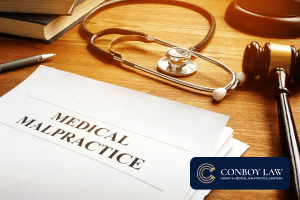
Filing a medical malpractice lawsuit in Chicago can be a complex process, often involving multiple steps and legal considerations. The time it takes to file can vary based on the specifics of the case. Typically, the process begins with understanding the nature of the medical malpractice and gathering the necessary evidence. It’s crucial to know that Illinois law sets specific guidelines for filing such claims, which impact the timeline.
After identifying a potential medical malpractice case, the first important action is to seek guidance from an experienced medical malpractice attorney. This legal expert will evaluate the details of the case, including medical records and the doctor-patient relationship, to determine its viability. They will also explain the legal process, including Illinois’s statute of limitations and pre-litigation requirements. Understanding these aspects is vital for a smooth legal journey.
At Conboy Law, we can help you file a medical malpractice claim to cover your medical bills. Learn more below. Then, contact us to schedule a free consultation.
Malpractice law in Illinois is designed to protect patients from negligence or errors by medical professionals. Medical malpractice happens when a healthcare provider departs from the standard of care, causing detriment to a patient. This can include misdiagnosis, surgical errors, or improper treatment. To establish a medical malpractice claim, proving that the medical professional’s actions directly caused harm is essential.
Illinois law also requires that a medical malpractice claim show a breach of the standard of care in the medical community. This means the medical professional’s actions were not in line with what a competent professional would have done under similar circumstances. Proving this often requires the testimony of medical expert witnesses, which is critical to building a strong case.

The first action in pursuing a medical malpractice lawsuit is to seek guidance from a Chicago medical malpractice attorney. This legal expert will help you understand your rights and the feasibility of your claim. They will evaluate the details of your case, including the extent of harm and the circumstances of the medical negligence.
When you engage with an experienced medical malpractice attorney, they will analyze the particulars of your case. This discussion includes reviewing medical records, understanding the medical procedures involved, and identifying the medical professionals responsible. The attorney will also clarify the legal steps, including filing deadlines and what to expect during the lawsuit.
An experienced medical malpractice lawyer will also inform you about the potential outcomes of your case. This includes discussing possible medical malpractice settlements and the likelihood of going to trial. They will provide a practical evaluation of the strengths and weak points of your claim, helping you make informed decisions.
Gathering medical records is vital for filing a medical malpractice lawsuit. These records provide evidence of the medical treatment you received and are essential for proving your case. They help establish the timeline of events and show the medical professional’s actions.
The importance of detailed and accurate medical records cannot be overstated. They not only support your claim but also help medical expert witnesses understand the case. Your lawyer will assist you in obtaining these records, ensuring they are complete and relevant to your case.
To establish a malpractice claim, it’s essential to prove that the medical professional’s actions or lack thereof directly caused harm. This involves showing that their conduct fell below the standard of care expected in the medical field. Your lawyer will help gather the necessary evidence and expert opinions to support this claim.
It is crucial to link the medical professional’s actions to the harm suffered, such as a burn injury. This connection is the core of a medical malpractice claim. Your lawyer will work to demonstrate how the medical professional’s negligence directly impacted your health.
In Chicago, the statute of limitations for filing a medical malpractice lawsuit is generally two years from the date the patient knew or should have known of the injury. This time frame is crucial to keep in mind, as failure to submit within this duration can result in losing the right to sue. Your medical malpractice attorney will ensure that all filings occur within this legal timeframe.
Illinois law requires a qualified healthcare professional to review a lawsuit before filing it. This expert must certify that there is a reasonable and meritorious cause for the lawsuit. This requirement prevents frivolous claims and ensures that only valid cases proceed to court.
The medical expert will examine the medical records and other evidence to confirm that medical malpractice occurred. Your lawyer will facilitate this process, working with medical experts to construct a robust base for your lawsuit.

Medical expert witnesses are crucial in medical malpractice cases. They provide professional insights into the standard of care and whether the medical professional in question deviated from it. Their testimony is often pivotal in proving negligence.
These experts help in understanding complex medical issues. They translate medical jargon into understandable language, making it clearer for the jury and judge. Their expertise is vital in establishing the link between the medical professional’s actions and the harm suffered, such as cerebral palsy or a birth injury.
The discovery phase unfolds next, where all sides collect evidence for the medical malpractice lawsuit. This process involves exchanging documents, answering questions, and taking depositions. It’s a critical phase where each side builds its case.
Interrogatories consist of written questions sent by one party to the other, requiring a written response. Depositions involve oral questioning in a formal setting, where witnesses provide testimony under oath. Both are essential tools for uncovering facts and understanding the opponent’s case.
Thorough preparation for interrogatories and depositions is key. Your lawyer will help formulate the questions and guide you in providing clear, accurate answers. They will also prepare you for deposition, ensuring you understand the process and what to expect.
Demands for the production of documents are a standard part of the discovery process. This involves asking the other party to provide relevant documents, such as medical records, emails, and policy manuals. These documents can provide critical evidence for your case.
Your lawyer will identify and request essential documents. They will carefully review these documents to find evidence supporting your claim. This step is crucial in building a strong case and challenging the opposing party’s arguments.
Admissions of fact are statements that one party asks the other to admit or deny. The genuineness of documents refers to confirming that a document is authentic. Both are important in clarifying the issues in dispute and the evidence available.
These tools can simplify the case and focus on the key issues. Your lawyer will use these tools effectively to streamline the trial process, reducing the number of issues that need proving in court.

Settlement negotiations are a common way to resolve medical malpractice lawsuits prior to going to trial. Both parties discuss a possible agreement to avoid the uncertainties of a trial. Mediation involves a neutral third party. This party will facilitate any discussions.
Settlement and mediation have benefits. They can provide a quicker resolution and potentially less emotional stress than a trial. Your attorney will negotiate for you, striving for a fair and adequate settlement reflecting your harm.
If a settlement is not reached, the case goes to trial. The duration of a trial in a medical malpractice case can vary. It depends on the circumstances of the case and the court schedule. Trials involve presenting evidence, witness testimony, and expert opinions to a judge or jury.
What should you expect during the trial? Your lawyer will present your case, challenging the defendant’s arguments. The trial is the opportunity to fully argue your case before a judge or jury, who will then make a decision based on the evidence presented.
Motions or appeals can be filed after a trial. These can extend the duration of the case, especially if the losing party seeks to challenge the verdict. The final step is to enforce the judgment, such as collecting the awarded damages.
Appeals are usually filed based on mistakes that were made during the trial itself. If you win the case, your lawyer will assist in enforcing the judgment, ensuring you receive the compensation awarded.

If you’re thinking about submitting a medical malpractice lawsuit in Chicago, contact Conboy Law. Our compassionate medical malpractice lawyers are dedicated to helping you navigate the complex legal process. We offer a free consultation to discuss your case and provide personalized legal advice.
It is critical to choose the right law firm for your case. Conboy Law has a track record of successfully handling medical malpractice cases, offering compassionate and skilled legal representation. Take a closer look at our case results here. Contact us today to schedule a free case consultation.
If you or a loved one has been injured, don’t hesitate to contact our injury attorneys today!
"*" indicates required fields


